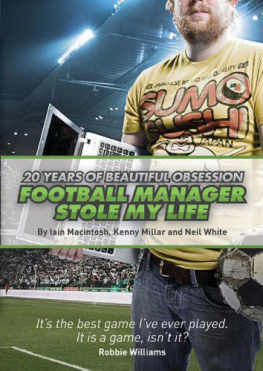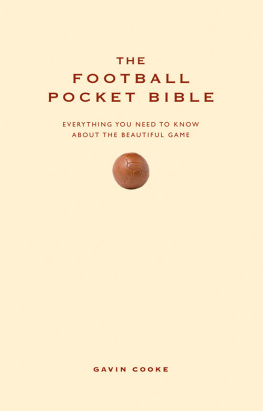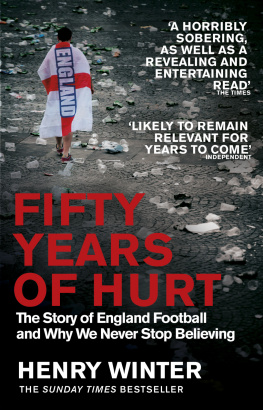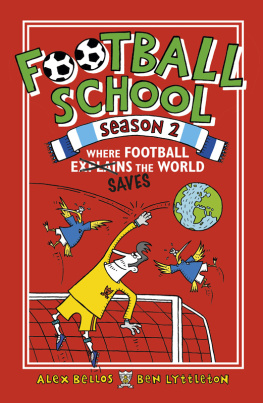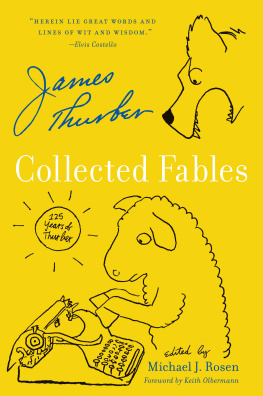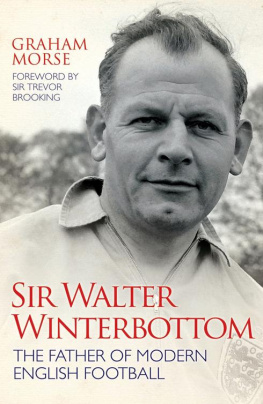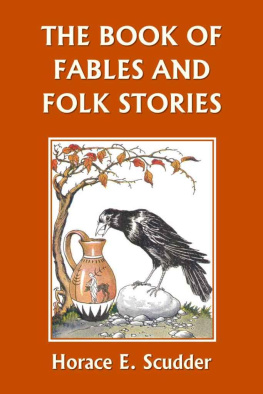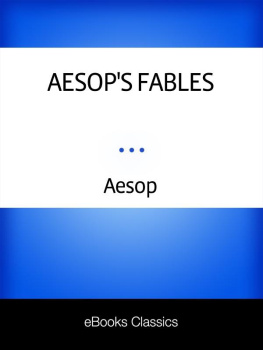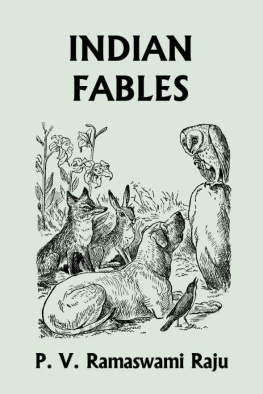FOOTBALL FABLES
Iain Macintosh

CONTENTS
Before I do anything else, might I first thank you for taking this book down from the shelf? The chances are that you found it tucked up in the middle of the sports section flanked on one side by a heavily blinged 23-year-old midfielders autobiography and on the other by an unauthorised look at a 21-year-old who has scored fewer goals for England than Mick Channon. Maybe Channon himself was there as well, but I doubt it somehow.
The market is crammed with glossy, sanitised chronicles that have been so closely monitored by a football agent that you can still smell the aftershave in the binding. It always seems strange when people in their twenties release autobiographies. I thought you were supposed to write your memoirs as you toddled up the garden path towards deaths door. Certainly the best Ive ever read were the books by the late Brian Clough and the slightly later Sir Stanley Matthews. If I want to read a life story, I would generally go to someone who has lived their life and who might be in a position to bestow snippets of wisdom. If I want to learn how to play tinny, repetitive R&B from a cheap mobile phone, thats when Ill go to a 21-year-old. Besides, what can a current player really say about anyone anyway? Would you write a book hammering your boss or the boss of a rival company if youd only made two payments to your pension fund? Of course not, youd be bland and inoffensive just in case anyone else wanted to hire you in the future.
The trouble is that even men at the end of a long and glittering career can write memoirs that are brain-meltingly boring. What Ive tried to do here is to avoid both pitfalls and create an anthology of football stories. An antidote to the anodyne. Instead of just one retired footballer telling you about everything hes ever done, Ive gone to speak to 15 of them and asked them to simply tell me one story. I hope that a combination of tales, from a selection of characters across a spread of eras, will be more interesting than someone telling you what kind of Ferrari he bought with his signing-on fee. The fact that youve plucked this book from the mle indicates that you might feel the same way.
Ive attempted to choose as eclectic a mix of interviewees as I could, covering both club and international football from 1970 onwards. Im afraid this book does not contain shiny, polished recollections of flash-in-the-pan twenty-somethings. It does not contain anything from anyone who has ever invited Atomic Kitten to their 18th birthday party and there are no mentions of Baby Bentleys anywhere. This book contains stories from proper footballers who have achieved great things, both on and off the pitch. Like the traditional fables of old, some of the details in the stories may be sketchily recalled or may have evolved over time through telling and retelling. This book is not an encyclopaedia. This book is all about the stories.
Welcome to Football Fables.
1 BARRY FRY
Southends Great Escape (1993)
Barry Fry arrived for our lunch in Peterborough and strode through the half-empty restaurant to meet me. A dozen heads instantly craned round in interest, for Fry is not a stealthy man. Taller than I first expected and well built, his gravelly laugh echoed around the room and, Im delighted to report, continued to attract attention throughout the afternoon, particularly when it followed a string of inventive swearwords.
A cult hero for many football fans, Fry is everything you would expect him to be, but slightly louder. There is no off switch, no respite and no hope of a quiet lunch for any of our fellow diners. Unlike some interviewees, he doesnt require any warming up at all. From the first question to the last, he rattles off a string of anecdotes, some of them far too libellous to be included here and all of them crammed with enough expletives to wear out my asterisk button.
Fry has become so synonymous with the dug-out in the last 20 years that many people are surprised to hear that he was a very promising footballer. Unfortunately, he never fulfilled his potential. Plucked from his native Bedford by Sir Matt Busby at a young age, he arrived at Manchester United with high hopes. Despite appearances for the England Schoolboy side, he failed to make the grade at Old Trafford and was released. His career never really got going and he retired at 28.
He blamed himself for this failure, acknowledging that he had been distracted by other interests in spite of Busbys warnings to moderate his behaviour. As a manager, however, he left a far greater mark. From convincing George Best to turn out for non-league Dunstable, to guiding tiny Barnet into the football league, he was a difficult man to ignore. Not only was he successful on a shoestring but his patented goal celebration of haring down the touchline like a firework in a flat cap was a big hit with the press.
Unfortunately, his chairman at Barnet, the notorious ticket tout Stan Flashman, was not always willing to let Fry have his own way. The two men clashed repeatedly, notably on one occasion when the chairman threatened to have his manager buried underneath the M25. Fry once told me that hed been sacked 38 times by Flashman. Indeed, in Ian Ridleys book A Season in the Cold, he is quoted as saying, Hes sacked me at least 20 times and hes meant it. But Ive just got up the next morning, gone to the ground and got on with my work, and hes phoned up two or three days later as if nothing has happened. There is going to be a time when he sacks me and really means it.
In the spring of 1993, after 14 years with the club, the uncertainty finally took its toll and Barry Fry ran out of patience with his boss.

I was finished at Barnet as soon as Stan Flashman put lawyers in charge of the club. Now, you have to remember at this stage that the club was so deep in the shit that Id had to lend them 164,000 of my own money just so it could survive and neither me nor the players had been paid for months. Anyway, I had a meeting with this lawyer. Hes come in and said he was taking over the running of the club. Obviously with me being one of the biggest creditors, I said, Where does this leave me?
He said, Well, youre just another creditor.
That didnt make me feel too valued. I told him that Id just been approached by Vic Jobson, the chairman at Southend, regarding the vacant managers job and I didnt know whether to take it or not.
He said immediately, How much will they pay us for your services?
I says, Well, as Im owed 164,000 from this football club, I dont think theyll pay fuck all.
But that was it. It made my mind up. He wasnt bothered about whether I wanted to go or not or anything like that. He was just bothered about how much the club in question wanted to pay for me. After that meeting I rang Vic Jobson, went down to Roots Hall and he offered me the job. Believe it or not, I was appointed as the new Southend Manager on April Fools Day.
At the time they was bottom of the league with nine games to go. Obviously the transfer deadline had been and gone. Nine games left and I think we was seven points adrift. Vic actually said we was down and I said he was a defeatist and that wed definitely stay up. He thought I was mad. So mad, he offered me a bonus if we survived! Ha, ha, ha! So that worked out well!
The next day the team was travelling up to Sunderland for a league game. I live in Bedford so my wife drove me to the roundabout where the coach would come past and pick me up. Ill never forget getting on that coach. Danny Greaves, my only member of staff and a massive unsung hero throughout that run-in, introduced me to everyone.


